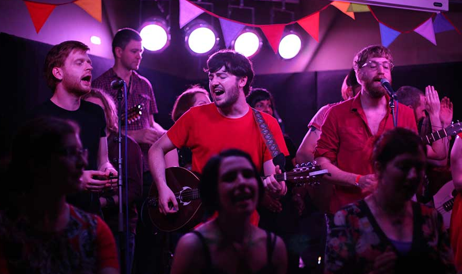The Glad Cafe
The Glad Café on Glasgow’s south side has many hidden aspects; aspects which are not immediately apparent as you step through the doorway away from the rumbling traffic of a busy main road, writes Jenny McBain.
The large coffee bar has a rather industrial aesthetic of exposed pipe work and rough concrete flooring, softened by areas of timber panelling and an eclectic mix of vintage, wooden tables. A waiter walks past carrying an iced ginger cake and a plate of scones. It’s breakfast time and the smell of coffee, along with the sight of a wide array of freshly baked goods, whets our appetites, so we sit down to order sustenance for the task ahead.
We are to meet with Rachel Smillie who set up this café, along with………) and is running it as multi-faceted social enterprise. For us, it is a warm and welcoming place to refuel on a visit to the big city and we are not the only ones enjoying laid back hospitality.
Two men sitting across form us, have the relaxed countenance of old friends who meet regularly for a catch up.. But what I wonder is the underlying aim or social purpose which distinguishes Glad Café from regular catering establishments?
Colourful posters advertising musical and comedy events paper the walls. So this is obviously an arts venue as well as a café. I have just enough time to spoon in some porridge with berry compote and am about to start on the Eggs Florentine, when Rachel joins us for a chat.
She confirms that music is an underlying passion of hers. “I love the way that music and other art forms excite people so much and I wanted to create a place where people from different backgrounds could socialise.”
Rachel was inspired by a visit to the multicultural Café Oto in London. She wanted to set up a place, in her hometown of Pollokshields, that would bring together people from all cultural groups. “There is a vibrant Scottish Asian community here in Glasgow’s south side and people are friendly with each other but there was not much socialising going on between people from different ethnic backgrounds”, she says.
When the considerable set up costs have been repaid and there are actual profits, these will be ploughed into the provision of music lessons for people who would not otherwise have the opportunity to learn to play an instrument. However, good works are already in progress.
“At the moment a few musicians are teaching music to young people on a voluntary basis. In fact there are a lot of people coming together to make the place work. We have lovely staff, a great mix of volunteers and appreciative customers who make my job worthwhile.”
The volunteers include some young people who are facing barriers to employment and who come in for a few hours a week to build up their skills and confidence. One woman, who has experienced mental ill health, has progressed from a voluntary role to paid work as a cleaner. So the business is successful in creating opportunities for people. A small number of Scottish Asian people are beginning to make use of the café and Rachel and her colleagues are hopeful that more will do so in future.
But all the social initiatives at the Glad Café are being achieved out with what is actually required by the business’s Community Interest Company (CIC) structure. This is because Rachel does not want to be hidebound by bureaucracy. (Other forms of social enterprise dictate that there must be a set quota of ‘vulnerable employees’.) Something that Rachel did not want to sign up to. She says, “We didn’t want to tie ourselves in knots promising something that we couldn’t actually do.”
Rachel has poise as well as passion. She communicates in calm, measured tones so it is no surprise to learn that she is a professional singer, musician and story teller. She says, “Soon after I got married I lived in Nigeria for a couple of years and became aware of a storytelling culture which is very much alive. On moving to Scotland, I realised that there is a similar tradition here, so I started volunteering to tell stories and sing songs in nurseries and primary schools.”
Rachel’s voluntary work led to a twenty year career as a professional storyteller and arts administrator. Now a grandmother, she is happy to be able to create a legacy for her community and for future generations. And she is focusing on funding it all through business endeavour.
She says, “I know from experience how much energy is expended when you operate under grant funding. I wanted this to be a sustainable business.”
At this point in the conversation a door behind us opens to reveal a cavernous room with a fully stocked bar situated to one side. This is the music venue run by Rachel’s son, ???? Indi, jjjj, and traditional tunes are all heard here.
We say our goodbyes, pay the bill and step back outside where background music gives way to the whoosh of traffic.
Next door to the café is yet another strand to this buzzing enterprise. ‘Glad Rags’ is open for business, selling vintage clothing and second hand books. It has been a most enjoyable and inspirational visit and I have a souvenir. ‘Glad Rag’ is a magazine carrying creative content from some of those involved in the Café. We are glad we made the effort to drop by!















Write Your Comment